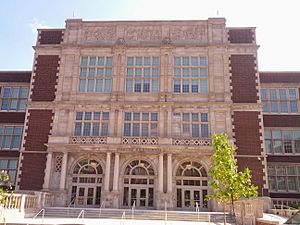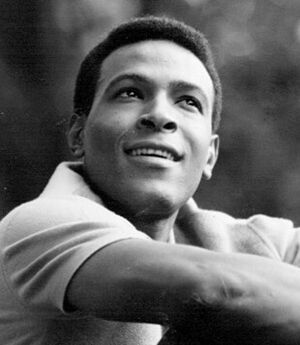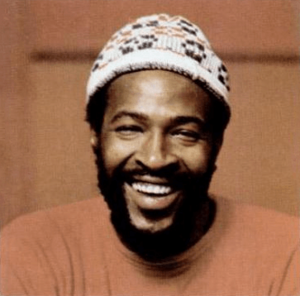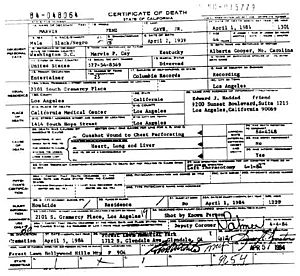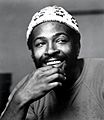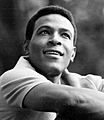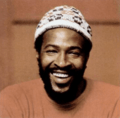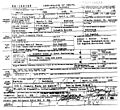Marvin Gaye facts for kids
Quick facts for kids
Marvin Gaye
|
|
|---|---|
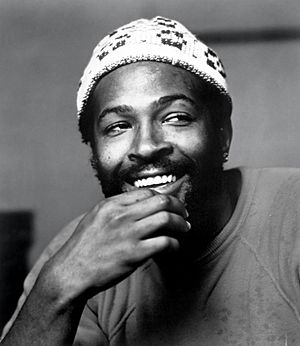
Gaye in 1973
|
|
| Born |
Marvin Pentz Gay Jr.
April 2, 1939 Washington, D.C., U.S.
|
| Died | April 1, 1984 (aged 44) Los Angeles, California, U.S.
|
| Occupation |
|
| Years active | 1957–1984 |
| Spouse(s) |
Janis Hunter
(m. 1977; div. 1981) |
| Children | 3, including Nona Gaye |
| Musical career | |
| Genres | |
| Instruments |
|
| Labels | |
| Associated acts | |
Marvin Pentz Gay Jr., also known as Marvin Gaye (born April 2, 1939 – died April 1, 1984), was an American R&B and soul singer. He helped create the famous "Motown Sound" in the 1960s. First, he worked as a musician in the studio. Later, he became a solo artist with many hit songs. People called him the "Prince of Motown" and "Prince of Soul."
Some of Gaye's most famous Motown songs include "Ain't That Peculiar", "How Sweet It Is (To Be Loved By You)", and "I Heard It Through the Grapevine". He also sang duets with Mary Wells, Kim Weston, Tammi Terrell, and Diana Ross. In the 1970s, Gaye released important albums like What's Going On and Let's Get It On. He was one of the first Motown artists to gain more control over his music.
His later songs influenced new styles of R&B music, like quiet storm and neo soul. Marvin Gaye's last TV appearances were at the 1983 NBA All-Star Game, where he sang "The Star-Spangled Banner". He also appeared on Motown 25: Yesterday, Today, Forever and Soul Train.
Contents
Marvin Gaye's Early Life
Marvin Pentz Gay Jr. was born on April 2, 1939, in Washington, D.C. His father, Marvin Gay Sr., was a church minister, and his mother, Alberta Gay, worked at home. Marvin's first home was in a public housing project called the Fairfax Apartments. This area was nicknamed "Simple City" because it felt like "half-city, half country."
Marvin was the second of his parents' four children. He had two sisters, Jeanne and Zeola, and one brother, Frankie Gaye. He also had two half-brothers.
Gaye started singing in church when he was four years old. His father often played the piano for him. His family belonged to a church that followed strict rules and teachings from the Old and New Testaments. Marvin loved singing from a young age. When he was 11, he sang "Be My Love" by Mario Lanza in a school play. This performance encouraged him to think about a music career.
He went to Syphax Elementary School and then Randall Junior High School. In junior high, he took singing more seriously and became a star in the Randall Junior High Glee Club.
In the mid-1950s, his family moved to the East Capitol Dwellings public housing project in D.C. This was Marvin's home until 1962.
Gaye briefly attended Spingarn High School before moving to Cardozo High School. At Cardozo, he joined several doo-wop singing groups, like the Dippers and the D.C. Tones. His relationship with his father became difficult during his teenage years. In 1956, at age 17, Gaye left high school and joined the United States Air Force. He was disappointed with the simple tasks he had to do. He pretended to be mentally unwell and was discharged soon after. His sergeant said he refused to follow orders.
Marvin Gaye's Music Career
Starting Out in Music
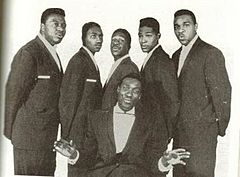
After leaving the Air Force, Gaye and his friend Reese Palmer formed a singing group called The Marquees. They performed in the D.C. area and worked with Bo Diddley. The group released one song, "Wyatt Earp," but it was not a hit. Gaye also started writing music during this time.
Later, Moonglows co-founder Harvey Fuqua hired The Marquees. The group changed its name to Harvey and the New Moonglows and moved to Chicago. They recorded several songs in 1959, including "Mama Loocie," which was the first song where Gaye sang the main part. The group also sang backup for famous artists like Chuck Berry on songs such as "Back in the U.S.A."
In 1960, the group broke up. Gaye moved to Detroit with Fuqua. He signed with Tri-Phi Records and played drums for other artists. In December 1960, Gaye performed at the home of Motown president Berry Gordy. Gordy was impressed and signed Gaye to Motown's Tamla label.
When Gaye joined Tamla, he wanted to sing jazz music and classic songs, not R&B. Before his first song was released, he added an "e" to his last name, spelling it "Gaye," like Sam Cooke.
Gaye released his first song, "Let Your Conscience Be Your Guide", in May 1961. His first album, The Soulful Moods of Marvin Gaye, came out a month later. These early songs were not successful. In 1961, he spent most of his time playing drums for artists like The Miracles and The Marvelettes for $5 a week. He was told to sing with his eyes open and move more on stage. He later regretted not taking dance lessons from Cholly Atkins, unlike many other Motown artists.
First Big Hits
In 1962, Gaye helped write "Beechwood 4-5789" for the Marvelettes and played drums on it. His first solo hit, "Stubborn Kind of Fellow", came out in September. It reached No. 8 on the R&B chart. He then had a pop hit with "Hitch Hike". In 1963, "Pride and Joy" became his first song to reach the top ten.
These songs were on his second album, That Stubborn Kinda Fellow, released in January 1963. Starting in October 1962, Gaye performed in the Motortown Revue. This was a series of concerts for mostly Black musicians in the U.S. A filmed performance of Gaye at the Apollo Theater happened in June 1963. Later that year, a live album, Marvin Gaye Recorded Live on Stage, was released. "Can I Get a Witness" became one of his first international hits.
In 1964, Gaye recorded a successful duet album with Mary Wells called Together. It reached No. 42 on the pop album chart. Their songs "Once Upon a Time" and "What's the Matter With You Baby" both reached the top 20. Gaye's next solo hit, "How Sweet It Is (To Be Loved By You)", reached No. 6 on the Hot 100. He started appearing on TV shows like American Bandstand. In 1964, he was also in the concert film, The T.A.M.I. Show.
Gaye had two number-one R&B songs in 1965: "I'll Be Doggone" and "Ain't That Peculiar". Both songs sold over a million copies. After this, Gaye recorded a jazz-style tribute album for the late Nat King Cole.
After recording "It Takes Two" with Kim Weston, Gaye began working with Tammi Terrell. They recorded many duets, including "Ain't No Mountain High Enough", "Your Precious Love", "Ain't Nothing Like the Real Thing" and "You're All I Need to Get By".
In October 1967, Tammi Terrell collapsed during a performance with Gaye. Doctors found she had a brain tumor. This ended her live performing career, but she continued to record. Terrell's illness made recording difficult, and she had many operations. Gaye was very sad about Terrell's sickness and became unhappy with the music business.
On October 6, 1968, Gaye sang the national anthem at the 1968 World Series in Detroit, Michigan.
In late 1968, Gaye's song "I Heard It Through the Grapevine" became his first song to reach No. 1 on the Billboard Hot 100. It sold over four million copies. However, Gaye felt he "didn't deserve" the success and felt like a "puppet." He followed this with "Too Busy Thinking About My Baby" and "That's the Way Love Is", which were also top ten hits in 1969. That year, his album M.P.G. became his first No. 1 R&B album. During this time, Gaye also produced and co-wrote "Baby I'm For Real" and "The Bells" for The Originals.
Tammi Terrell passed away from brain cancer on March 16, 1970. Gaye attended her funeral. After a sad period, Gaye wanted to try out for a professional football team, the Detroit Lions. He became friends with players Mel Farr and Lem Barney. The Lions eventually decided not to let Gaye try out, fearing he might get hurt and it would affect his music career.
What's Going On and Later Success
On June 1, 1970, Gaye recorded his new song "What's Going On". He was inspired by an idea from Renaldo "Obie" Benson of the Four Tops after seeing a protest. When Berry Gordy heard the song, he didn't want to release it. He thought it was "too political" and feared Gaye would lose fans. Gaye refused to release any other new music until Motown released "What's Going On". When it came out in 1971, it quickly reached No. 1 on the R&B charts and sold over two million copies.
Gaye then recorded the entire What's Going On album in ten days. Motown released it in May. The album became Gaye's first to sell over a million copies, with two more top ten songs: "Mercy Mercy Me (The Ecology)" and "Inner City Blues". This album was one of Motown's first where an artist had so much creative freedom. It was a "concept album" with a strong theme and connected songs. Many people called it one of the most important soul music albums ever. Gaye received two Grammy Award nominations and several NAACP Image Awards for the album. Billboard magazine named Gaye Trendsetter of the Year.
In 1971, Gaye signed a new deal with Motown for $1 million. This was the biggest deal for a Black recording artist at that time. Gaye's first project under the new contract was the soundtrack Trouble Man, released in late 1972. Before that, he released a song called "You're the Man". The album of the same name was meant to follow What's Going On, but Motown didn't promote the single. Some say Berry Gordy worried Gaye's political views would upset some fans. So, Gaye put that project aside and released Trouble Man instead. In 2019, the full You're the Man album was finally released. Around this time, Gaye and his family moved to Los Angeles.
In August 1973, Gaye released the Let's Get It On album. Its title track became his second No. 1 song on the Hot 100. This album was praised for its strong, loving feel. Other songs from the album included "Come Get to This" and "You Sure Love to Ball".
Marvin's last duet album, Diana & Marvin, with Diana Ross, was a big international success. Much of the music was written just for them. Because fans and Motown wanted it, Gaye started his first concert tour in four years on January 4, 1974. The show was highly praised and led to a live album, Marvin Gaye Live!, and a live version of "Distant Lover".
The tour made Gaye even more famous as a live performer. For a while, he earned $100,000 a night for his shows. He toured throughout 1974 and 1975. A new contract with Motown allowed Gaye to build his own recording studio.
In October 1975, Gaye performed at a UNESCO benefit concert in New York to support literacy in Africa. He was honored at the United Nations for this. His next studio album, I Want You, came out in March 1976. The title track reached No. 1 on the R&B charts, and the album sold over one million copies. That spring, Gaye went on his first European tour in ten years. In early 1977, he released the live album, Live at the London Palladium, which sold over two million copies thanks to the hit song "Got to Give It Up", which reached No. 1.
In December 1978, Gaye released Here, My Dear. This album was inspired by the end of his first marriage. It was recorded so that some of the money would go to his former wife. The album did not sell well.
Midnight Love
After leaving Motown, Gaye signed with Columbia Records. He worked on his first album after Motown, called Midnight Love. The first song, "... Healing", was released in September 1982. It became Gaye's biggest hit, staying at No. 1 on the R&B chart for ten weeks. It was the biggest R&B hit of the 1980s. In January 1983, it reached No. 3 on the Billboard Hot 100. It was also a hit in other countries, selling over two million copies in the U.S. alone. Gaye won his first two Grammy Awards for this song, including Best Male R&B Vocal Performance. He also won an American Music Award. Midnight Love the album was released less than a month after the song. It was also very successful, reaching the top ten on the Billboard 200 and becoming Gaye's eighth No. 1 R&B album. It eventually sold three million copies in the U.S.
On February 13, 1983, Gaye sang "The Star-Spangled Banner" at the 1983 NBA All-Star Game in Inglewood, California. The next month, Gaye performed at the Motown 25: Yesterday, Today, Forever TV special. These, and a May appearance on Soul Train, were Gaye's last TV performances. Gaye began his final concert tour on April 18, 1983, in San Diego. The tour ended on August 14, 1983. After the tour, he moved into his parents' house in Los Angeles. In early 1984, Midnight Love was nominated for another Grammy Award.
Marvin Gaye's Personal Life
Gaye married Berry Gordy's sister, Anna Gordy, in June 1963. They later divorced in 1977. Gaye then married Janis Hunter in October 1977. They separated in 1979 and divorced in February 1981.
Marvin Gaye had three children: Marvin III, Nona, and Frankie. Marvin III was the biological son of Anna's niece, Denise Gordy. Nona and Frankie were born to Gaye's second wife, Janis. When he passed away, Gaye was survived by his three children, his parents, and five siblings.
Marvin Gaye's Passing
Marvin Gaye passed away on April 1, 1984, just one day before his 45th birthday. His body was cremated, and his ashes were scattered into the Pacific Ocean.
Marvin Gaye's Musical Talents
Instruments He Played
Marvin Gaye started as a drummer, playing for other artists in his early Motown years. Over time, he also learned to play the piano, keyboards, synthesizers, and organ. He also used many percussion instruments, like bells, finger cymbals, box drums, glockenspiels, vibraphones, bongos, congas, and cabasas. This became clear when he gained more control over his music at Motown and produced his own albums. He also used the TR-808, a drum machine popular in the early 1980s, for his Midnight Love album. The piano was his main instrument when performing live, but he sometimes played drums too.
Who Influenced Him
As a child, Gaye was greatly influenced by his father's sermons. His first big musical influences were doo-wop groups like The Moonglows and The Capris. The Capris' song, "God Only Knows", was very important to him. Gaye said it had "so much soul, so much hurt." His main musical influences were Rudy West of The Five Keys, Clyde McPhatter, Ray Charles, and Little Willie John. Gaye also looked up to Frank Sinatra, Billy Eckstine, and Nat King Cole for their vocal styles.
As his Motown career grew, Gaye found inspiration in other Motown artists like David Ruffin of The Temptations and Levi Stubbs of the Four Tops. Their rougher voices led Gaye and his producers to try a similar sound in songs like "I Heard It Through the Grapevine". Gaye later said he heard something in their voices that his own voice lacked. He felt their music reminded him that women often want to feel the power of a "real man" in music.
His Singing Style
Marvin Gaye had a four-octave vocal range. In his early recordings, he mainly sang in the baritone and tenor ranges. For his gospel-inspired early hits like "Stubborn Kind of Fellow," he changed his voice to a raspy sound. Songwriter Eddie Holland said Gaye could take any type of song and make it his own. He called Gaye's voice "one of the sweetest and prettiest voices you ever wanted to hear."
In the late 1960s, Gaye changed his vocal style again, using a sharper, raspy voice in songs produced by Norman Whitfield. Gaye didn't like this new style at first, but he learned to adapt. After listening to David Ruffin and Levi Stubbs, Gaye developed what he called his "tough man voice," saying, "I developed a growl." By the early 1970s, Gaye had "three distinct voices: his smooth, sweet tenor; a growling rasp; and an unreal falsetto." He also layered his voice many times on recordings, creating a rich, complex sound.
Marvin Gaye's Legacy
Marvin Gaye has been called "the number-one purveyor of soul music." He was described as someone who "went beyond the usual limits of rhythm and blues like no other performer before him." After his passing, The New York Times said Gaye "mixed the soul music of the city with the feeling of old-time gospel singers and became an important force in pop music." His recordings for Motown in the 1960s and 1970s helped define the label's unique sound. His work earned him the titles Prince of Soul and Prince of Motown. He was one of the first Motown artists to break free from the label's strict production system, opening the way for artists like Stevie Wonder. His later music influenced modern R&B styles like quiet storm and neo-soul.
Many artists, including Barry White, Stevie Wonder, and Frankie Beverly, have said Marvin Gaye greatly influenced their music. For his role in the film Dreamgirls, Eddie Murphy copied Gaye's 1970s clothing style.
Marvin Gaye's name has been mentioned in many hit songs, like Big Sean's "Marvin Gaye & Chardonnay" and Charlie Puth's debut hit, "Marvin Gaye". He is also mentioned in the 1983 Spandau Ballet song "True," which says, "Listening to Marvin all night long..."
Awards and Honors for Marvin Gaye
The Rock and Roll Hall of Fame welcomed Marvin Gaye in 1987. They said he "made a huge contribution to soul music and the Motown Sound." They noted that Gaye had a "classic R&B voice that was rough yet sweet." A year after his passing, the mayor of D.C. declared April 2 as "Marvin Gaye Jr. Memorial Scholarship Fund Day." A non-profit group now organizes annual Marvin Gaye Day Celebrations in Washington, D.C.
In 1988, Gaye was inducted into the NAACP Hall of Fame. In 1990, he received a star on the Hollywood Walk of Fame. In 1996, he was given the Grammy Lifetime Achievement Award. The Rock and Roll Hall of Fame listed three of Gaye's songs among its 500 Songs That Shaped Rock and Roll. Rolling Stone magazine ranked Gaye No. 18 on their list of the "100 Greatest Artists of All Time," sixth on their list of "100 Greatest Singers of All Time," and 82nd on their list of "100 Greatest Songwriters of All Time."
Three of Gaye's albums – What's Going On (1971), Let's Get It On (1973), and Here, My Dear (1978) – were ranked on Rolling Stone magazine's list of the 500 Greatest Albums of All Time. What's Going On is his highest-ranked album, reaching No. 6 on the Rolling Stone list. It was also chosen in 2003 by the Library of Congress for its National Recording Registry. In a 2020 Rolling Stone list, What's Going On was named the greatest album of all time. Also, four of his songs made it onto the Rolling Stone list of the 500 Greatest Songs of All Time.
In 2005, Marvin Gaye was voted into the Michigan Rock and Roll Legends Hall of Fame.
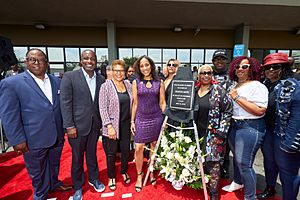
In 2006, Watts Branch Park in Washington, D.C., where Gaye spent time as a teenager, was renamed Marvin Gaye Park. Three years later, a street in Washington, D.C., was renamed Marvin Gaye Way. In August 2014, Gaye was inducted into the official Rhythm and Blues Music Hall of Fame. In October 2015, the Songwriters Hall of Fame announced Gaye as a nominee for induction. He was inducted into that hall on June 9, 2016. In July 2018, a bill to rename a post office in Los Angeles after Gaye was signed into law.
In January 2023, Rolling Stone ranked Gaye number 20 on their list of "The 200 Greatest Singers of All Time."
Acting Roles
Marvin Gaye acted in two movies, playing a Vietnam veteran in both. His first role was in the 1969 film The Ballad of Andy Crocker, starring Lee Majors. Gaye had a notable role as David Owens. His other role was in the 1971 film Chrome and Hot Leather, about a group of Vietnam veterans fighting a bike gang. Gaye played Jim, one of the veterans. Gaye had dreams of being a movie star and signed with an agency, but he wasn't happy with their support. He later said he didn't have the strength to deal with the demands of Hollywood.
Discography
- The Soulful Moods of Marvin Gaye (1961)
- That Stubborn Kinda Fellow (1963)
- How Sweet It Is to Be Loved by You (1965)
- Moods of Marvin Gaye (1966)
- In the Groove (1968)
- M.P.G. (1969)
- What's Going On (1971)
- Trouble Man (1972)
- Let's Get It On (1973)
- I Want You (1976)
- Here, My Dear (1978)
- Midnight Love (1982)
- Together (with Mary Wells) (1964)
- Take Two (with Kim Weston) (1966)
- United (with Tammi Terrell) (1967)
- You're All I Need (with Tammi Terrell) (1968)
- Easy (with Tammi Terrell) (1969)
- Diana & Marvin (with Diana Ross) (1973)
- Marvin Gaye Recorded Live on Stage (1963)
- Marvin Gaye Live! (1974)
- Live at the London Palladium (1977)
Images for kids
See also
 In Spanish: Marvin Gaye para niños
In Spanish: Marvin Gaye para niños
- Pharrell Williams v. Bridgeport Music
 | Precious Adams |
 | Lauren Anderson |
 | Janet Collins |


